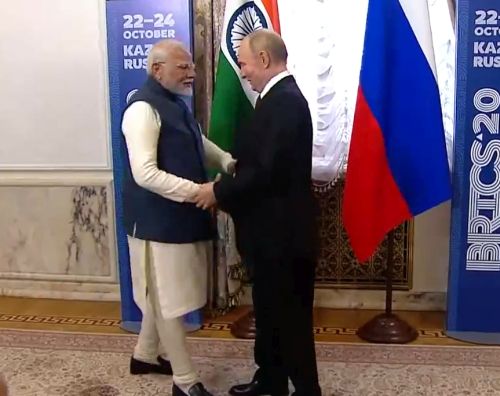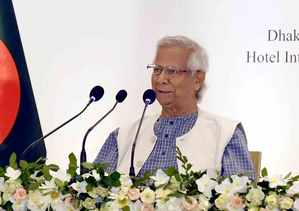International
Pak PM Shehbaz Sharif to meet Chief Justice over 'interference' in judicial affairs by intelligence agencies
Islamabad, March 28 (IANS) Pakistan’s Prime Minister Shehbaz Sharif has stepped into become a mediating partner between the judiciary and the powerful military establishment to avert a possible disastrous confrontation between the two.
Reliable sources have said that the open letter by at least six Islamabad High Court (IHC) judges in relations to interference by intelligence agencies in judicial matters have the tendency to trigger a dangerous rift between the two institutions. This is why Sharif, who is known to be close to the military establishment has been assigned to intervene in the matter and put it to rest at the earliest.
Sharif is meeting with Chief Justice of Pakistan (CJ) Qazi Faez Isa on Thursday (today) to not only discuss details of the open letter but also to come out with a face-saving conciliatory statement that talks more about value of coordinated working mechanism between parliament, judiciary and the establishment.
“The PM along with Minister of Law Azam Nazeer Tarar and Attorney General of Pakistan (AGP) Mansoor Awaz will meet with the CJ Qaxi Faez Isa and Senior Judge Syed Mansoor Ali Shah. Meeting will take place at the SC premises,” a senior government official said.
Concerned speculations of a possible conflict between the two powerful institutions have become more evident after at least six judges of the Islamabad High Court (IHC) wrote a letter to the Supreme Court of Pakistan (SCP) seeking clarity on the interventions and interference of spy agencies and their operatives in judicial matter.
The open letter, written by six judges of the Islamabad High Court (IHC) including Justice Mohsin Akhtar Kiyani, Justive Tariq Mehmood Jahangiri, Justive Babar Sattar, Justice Sardar Ejaz Ishaq Khan, Justice Arbab Muhammad Tahir and Justice Saman Rafat Imtiaz highlighted the blatant and disturbing interference of country’s intelligence agencies in the affairs of the court.
“We, therefore request that a judicial convention be called to consider the matter of interference of intelligence operatives with judicial functions and/or intimidation of judges in a manner that undermines the independence of the judiciary,” the open letter to the Supreme Court of Pakistan by the IHC judges stated.
Earlier, the Supreme Court held a full-court meeting to discuss the content of the IHC Judges’ letter, in which at least six of eight judges pointed direct fingers at the intelligence agencies for using coercive tactics to influence court proceedings, discussed the constitutional and judicial value of the letter and what action can be taken in this regard.
Pertinent to mention here that the latest controversy of a letter by the IHC Judges’ is part of a newly found confidence to stand against the powerful military establishment and its institutions among the serving judges after the recent notification of the SJC was set aside by CJ Qazi Faez Isa which resulted in the dismissal of former senior puisne judge of the IHC Shaukat Aziz Siddiqui.
Justice Siddiqui had also accused the intelligence agencies of manipulating the proceedings of the Islamabad High Court (IHC) during a speech at Rawalpindi Bar in July 2018.
Now, with Sharif due to meet in a rare meeting with the CJ Isa, senior lawyers are concerned of a manipulation in the final response of the Supreme Court in response to the IHC Judges’ letter.
“CJ Isa should have sought endorsement from all the judges before the meetings; otherwise it will not send a good optic for the judiciary as an institution,” said a senior lawyer.
“IHC judges wrote a letter to the Supreme Court and not to the government. The response should be representative of the Judiciary’s position as an institution only,” he added.
“There is no need for such meetings rite now when the country’s largest political party, the PTI, is claiming that they have been a victim of the manipulations of judicial proceedings in the past. Prime Minister Shehbaz should not have asked to meet the Chief Justice. Instead, he should have requested the chief justice to conduct an inquiry into the serious allegations made by the IHC judges,” another senior lawyer said.
The letter of IHC judges’ has certainly opened up a debate on the interference by intelligence agencies in judicial matter, decision and their timings of announcements.
Pakistan has a history of civil military divide and confrontations resulting in military takeovers. This time, it seems that a strong section of the judiciary has decided to take on the military establishment and its allied spy agencies to expose their forced maintenance of matters within the judiciary as well.
While the confrontation can have serious and dangerous consequences, PM Shehbaz seems to be on a damage control mission to have the apex court melt down the heat with its positioning on the critical matter.
–IANS
hamza/svn
International
Lee Hsien Yang seeks refuge in United Kingdom

Lee Hsien Yang, the youngest son of Singapore’s founding father, the late Lee Kuan Yew, announced on Tuesday that he is now a political refugee in the United Kingdom after seeking asylum from the British government “as a last resort.”
“I remain a Singapore citizen and hope that someday it will be safe to return home,” Lee stated in a Facebook post, as reported by Channel News Asia (CNA).
Citing what he described as the Singapore government’s “attacks” against him, Lee, who is the younger brother of former Prime Minister Lee Hsien Loong, revealed that he sought asylum protection in 2022.
Lee Hsien Yang and his late sister, Lee Wei Ling, who passed away earlier this month, have been in conflict with their brother Lee Hsien Loong over the fate of their father’s home following his death in 2015, resulting in a public dispute that has estranged the siblings.
In an interview with the UK-based newspaper The Guardian, Lee alleged that a “campaign of persecution” compelled him to seek asylum in Britain.
In response to his claims, the Singapore government stated that there is “no basis” for his allegations of “a campaign of persecution” or other assertions regarding political repression in the country.
“Singapore’s judiciary is impartial and makes decisions independently. This is why Singaporeans have a high level of trust in the judiciary,” a government spokesperson remarked.
The spokesperson added that there are no legal restrictions preventing Lee and his wife, lawyer Lee Suet Fern, from returning to Singapore. “They are and have always been free to return to Singapore,” the spokesperson said.
Lee and his wife have been outside of Singapore since 2022, having opted not to attend a scheduled police interview regarding potential offenses related to providing false evidence in judicial proceedings concerning their father’s will and the family home.
Lee and his late sister, who had been living at the property, alleged they felt threatened while trying to fulfill their father’s wish to demolish the house. They also accused their elder brother, former Prime Minister Lee Hsien Loong, of abusing his governmental influence to advance his personal agenda.
International
Indo-Russian ties are stronger than ever before at BRICS

Kazan, Russia: Prime Minister Narendra Modi held a bilateral meeting with Russian President Vladimir Putin on the sidelines of the 16th BRICS Summit.
During the meeting, President Putin remarked, “I recall our meeting in July, where we had productive discussions on various issues. We’ve also spoken over the phone several times. I am very grateful you accepted the invitation to come to Kazan. Today, we will attend the BRICS Summit’s opening ceremony, followed by dinner.”
PM Modi responded by expressing his appreciation, saying, “I sincerely thank you for your friendship, warm welcome, and hospitality. It’s a great pleasure to visit such a beautiful city as Kazan for the BRICS Summit. India shares deep historical ties with this city, and the opening of our new embassy here will further strengthen these connections.”
International
Laos seeks to enhance nutrition amid climate change concerns

Vientiane (Laos), Aug 22 (IANS) Representatives from the Lao government and development partners have attended a conference here titled “Climate Change and Nutrition in Laos: Intersections and Interventions” to discuss the impact of climate change on nutrition in the Southeast Asia country and potential solutions.
Speaking at the conference, deputy director general of the Department of Hygiene and Health Promotion under the Lao Ministry of Health Viengkhan Phixay, said, “We gather to address a critical and interwoven issue: the impact of climate change on nutrition and how we can work together to tackle these challenges,” Xinhua news agency reported.
The Lao government is actively engaged in this endeavor, with numerous policies and initiatives aimed at addressing both climate change and nutrition, Lao National Television reported on Thursday.
“By leveraging the Scaling Up Nutrition network in Laos, which is led by the government, and supported by civil society, donors, and the United Nations, we have a robust platform to tackle the negative impacts of climate change while improving nutrition and overall health for everyone in Laos,” Viengkham said at the conference held on Monday.
The conference featured a series of presentations that not only detailed evidence-based research but also introduced innovative tools for measuring and enhancing nutrition under the impact of climate change.
The conference stressed the critical need for integrated approaches to tackle the intertwined challenges of climate change and nutrition, and setting the stage for impactful future collaborations.
–IANS
int/psd
International
One killed, seven injured in shootout in Iraq

Baghdad, Aug 22 (IANS) A civilian was killed while seven others were injured on Thursday in a tribal shootout in Iraq’s holy Shiite province of Najaf, according to a local security source.
The shootout erupted in the early hours between armed men from the local tribe in the al-Zarga area in northern Najaf, some 160 km south of Baghdad, a local police officer told Xinhua on condition of anonymity.
The clash resulted in the killing of an Iraqi civilian and the injury of seven others, including three Iranian Shiite pilgrims, the source added.
A joint force from the Interior Ministry’s emergency response division and Najaf provincial police arrested 53 gunmen from both sides of the shootout and seized weapons and ammunition, the Interior Ministry said in a statement.
It added that search operations are ongoing to locate additional gunmen and weapons, with more details to be released later.
The incident took place as numerous pilgrims traveled to the city of Karbala to observe Arbaeen, which marks the end of a 40-day mourning period for the killing of Imam Hussein, the grandson of Prophet Muhammad, in the Battle of Karbala in 680 A.D.
Typically, these pilgrims also visit Najaf as part of their journey to Karbala.
–IANS
int/jk/arm
International
Bangladesh seeks $1 billion budget support from World Bank

Dhaka, Aug 22 (IANS) Bangladesh’s interim government has sought $1 billion from the World Bank as budgetary support.
The call came from the country’s Power, Energy and Mineral Resources Adviser Muhammad Fouzul Kabir Khan’s meeting with Abdoulaye Seck, the World Bank’s Country Director for Bangladesh and Bhutan, in Dhaka on Wednesday.
He made the plea as the ministry owes more than 2 billion dollars to suppliers in import costs of power and energy, Xinhua news agency reported.
Khan mentioned that the interim government, which was formed with many pressing mandates, is due to settle a $2 billion debt left by the previous government in the power sector.
He said they have already suspended activities under the much-criticized Quick Enhancement of Electricity and Energy Supply Act 2010 and abolished the government’s power to set energy prices without any public hearing.
On August 5, the former Prime Minister of Bangladesh, Sheikh Hasina, was ousted from her country and power, ending her rule since January 2009.
This event was seen as a massive escalation, with what initially started as student’s protests and resulted in a major crisis in Bangladesh.
Earlier on August 8, Nobel laureate Muhammad Yunus took oath as the head of Bangladesh’s interim government.
–IANS
int/jk/as
-
Video2 years ago
PM Modi Attacks Congress in Karnataka with “Kerala Story”
-
Politics2 years ago
Siddaramaiah & DK Shivakumar sworn in as Chief Minister & Deputy CM respectively
-
Cricket2 years ago
CSK players rejoice 5th IPL title with their families (Pics)
-
Entertainment2 years ago
Karan Deol weds his longtime Girlfriend Drisha Acharya (Pics)
-
Entertainment2 years ago
Urvashi Rautela dazzles on Cannes 2023 red carpet (Pics)
-
Sports7 years ago
History Of Official FIFA WORLD CUP Match balls
-
Entertainment2 years ago
Sunny Leone gets ready for Kennedy premiere in Cannes (Pics)
-
India2 years ago
Ashwini Vaishnaw: Railway Board recommends CBI probe in the Odisha railway disaster





























